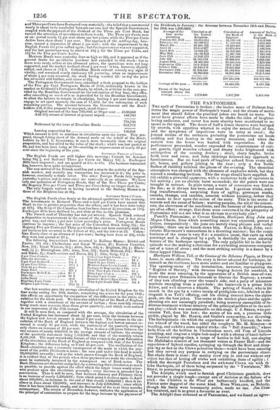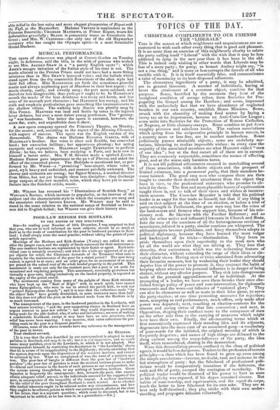THE PANTOMIMES.
THE spell of Pantomime is broken : the leaden mace of Dulness frus- trates the magic power of Harlequin's wand ; a»d the shouts of merri- ment that should follow the practical jokes are heard no more. Yet never have greater efforts been made to shake the sides of laughter- loving audiences, and never has more alacrity been manifested to re- spond to the appeal. The doors of half a dozen theatres were besieged by crowds, with appetites whetted to enjoy the annual feast of fan, and the symptoms of impatience were as noisy as usual ; the jocund strains of the orchestra preluding the pantomime set heads nodding and feet beating to the merry measures, and when the curtain rose the house was hushed with expectation. As the performance proceeded, wonder expanded the countenances of cari- ous gazers, rigid muscles relaxed and dreary looks brightened with anticipation of the coming drollery : short, sharp laughs, broke forth ever and anon, and faint titterings followed any approach to facetiousness. But no loud peals of laughter echoed from every side, pit, boxes, and gallery joining in the roar ; only a few feeble flashes of risibility relieved the gloom of the evening. The theatrical atmosphere was charged with the elements of explosive mirth, but they wanted a conducting medium. This the stage should have supplied. It did exhibit a powerful apparatus, with a numerous body of operators in full activity ; yet no electric burst succeeded; for the .points were not brought in contact. In plain terms, a want of connexion was fatal to the fun ; as it always has been, and must be. Ingenious tricks, start- IMg transformations, surprising feats of agility, grotesque masks, smacks, thumps, and tumbles, astonish without amusing, unless they are made to bear upon the action of the story. This is the secret of success and the cause of failure : wanting purpose, the wit of the concoc- ters, the cleverness of the machinist, and the humour of the performers, are of no effect : strange, that those most concerned in the prosperity of Pantomime will not see what is so obvious to everybody else! Punch's Pantomime, at Covent Garden, Harlequin King John and Magna Charta, from which something smart was expected, proved a failure, comparatively : the jests are merely slang phrases and verbal quibbles : there are no knock-down hits. PAYNE, as King John, cari- catures MACREADY'S mannerisms in a diverting manner ; but the comic business of the scene is very flat: a sensitive snout, that curls up with contempt and is elongated by a pull, is decidedly the most amusing feature of the burlesque opening. The only palpable hit in the harle- quinade was the making a chairman for a swindling assurance-company oat of a truss of straw; and the most striking novelty is a dance by a three-legged Chinese.
Harlequin William Tell, or the Genius of the Ribstone Pippin, at Drury Lane, is more effective. The story is better adapted for burlesque, in- asmuch as the incidents have more action and are familiar to playgoers. The opening-scene of the introduction, however, representing the " Regions of Slavery," with daemons forging fetters for mankind, is made the most amusing, by the appearance of a British man-of-war, from whose prow Britannia descends to liberate the Negroes ; a swarm of tiny tars climbing over the vessel's side, and a party of miniature marines emerging from a port-hole : the boatswain is a prime little felMw' and well deserves a whistle. The pelting of Gesler, who is bit smack in the eye by a votive turnip of prodigious size, labelled to dis- tinguish it as Tell's offering, and his sliding descent down the alpine peak, are the best jokes. The scene at the market-place and the apple- shooting are not amusingly parodied ; being scarcely susceptible of lu- dicrous treatment without mimicry of the principal performer in the seri- ous play—which was not admissible on this stage. C J. Stara, who per- sonates Tell, does his best; the antics of his son, a precious little pickle, played by Mr. HANCE, and Gesler's coxcombry, are diverting. The harlequinade.—in which the experience of Mr. Yourraz, the vete- ran wizard of the wand, has aided the neophyte Mr. M. MORTON—is bustling, and exhibi's some capital tricks : the " Bell Assembly," where bells from all the belfries in Christendom meet, old Tom of Lincoln presiding, and ring out a triple-bob-major with a chorus of hand-bells- the Teetotal singing-class, a range of kettles in full boil, out singing the Hullabaloo concert of ten thousand voices at Exeter Hall—and the apparition of lighted candles, springing up through the floor and disap- pea-ins as fast as the Clown perceives them—would have been amusing had they served any purpose in carrying on the pantomimic chace. But chace there is none : the motley crew trip in and out without any object but that of letting off tricks and exhibiting feats of agility ; i which the decrepid Pantaloon and the awkward Clown vie with th • lithe Harlequin, all of them being surpassed by the " T wirlabont," Mr. STILT, in posturing gymnastics.
The Adelphi, which used to furnish gond Christmas gambols, does
not provoke a single laugh—except one of derision at the failure of a trick : the Children in the Wood are barbarously handled, and the Fairies utter doggrel of the worst kind. Even WIELAND, as Nobody, though his limbs were incessantly active, made no fun. Jim Crow has returned, and is as great a favourite as ever.
The Adelphi dose sickened us of Pantomime, and we found an agree- able relief in the less noisy and more elegant pleasantries of Riquet with the TO, at the Haymarket Madame Vssrats is resplendent as the Princess Ezneralda; CHARLES MATHEWS, as Prince Riqiet, wears his deformities gracefully ; BLAND is pompously inane as Greenhorn the Great r and Mrs. W. CIXFFORD—the only. one of the old Haymarket company who has caught the Olympic spirit—is a most formidable Grand Duchess.























 Previous page
Previous page